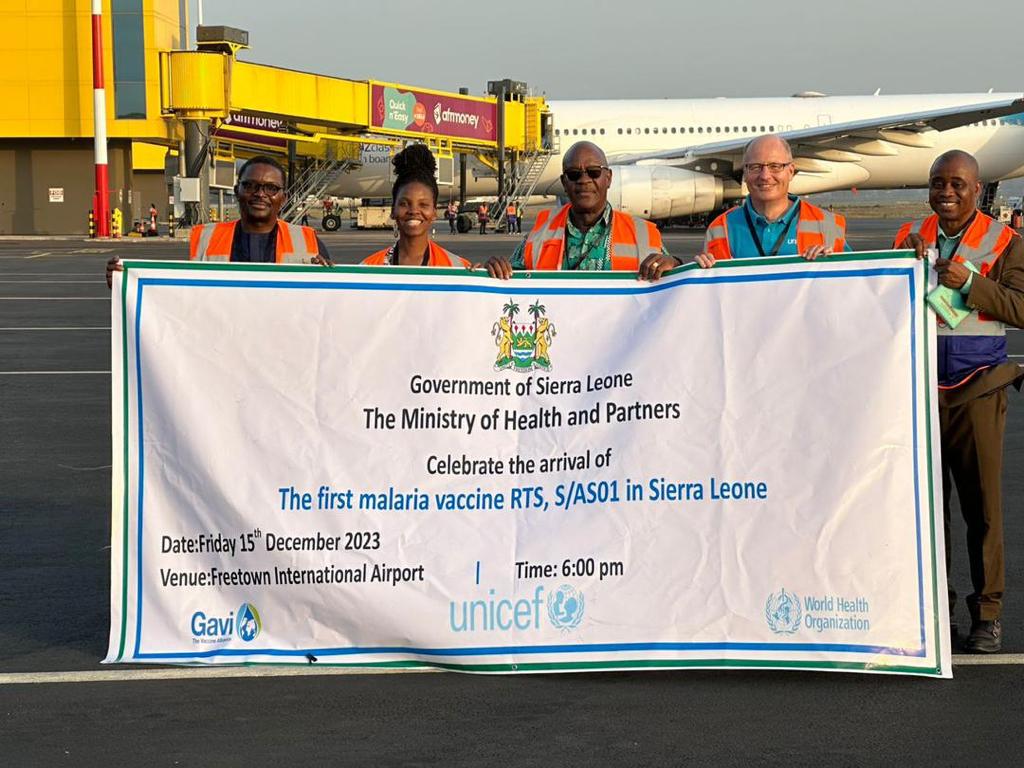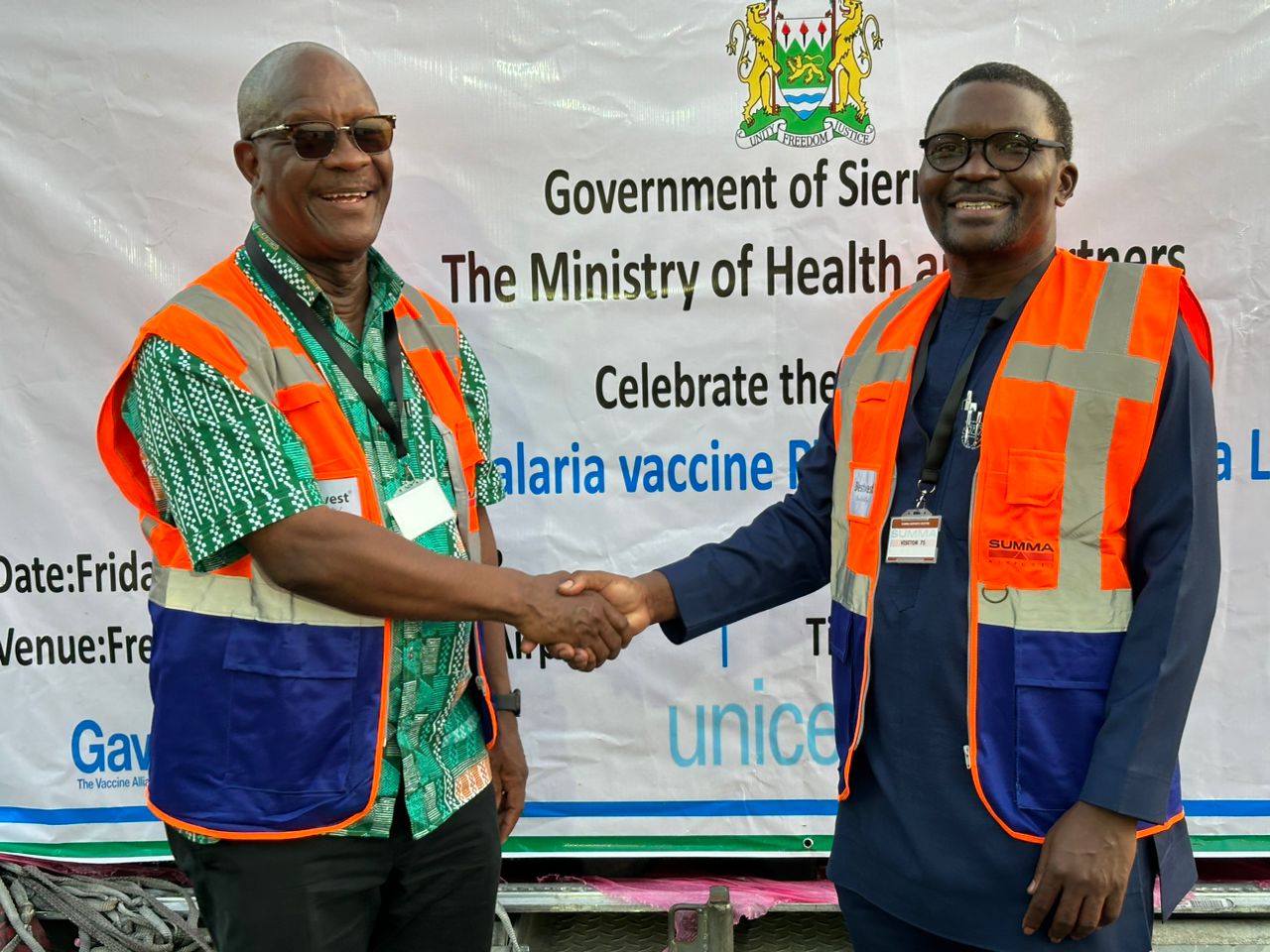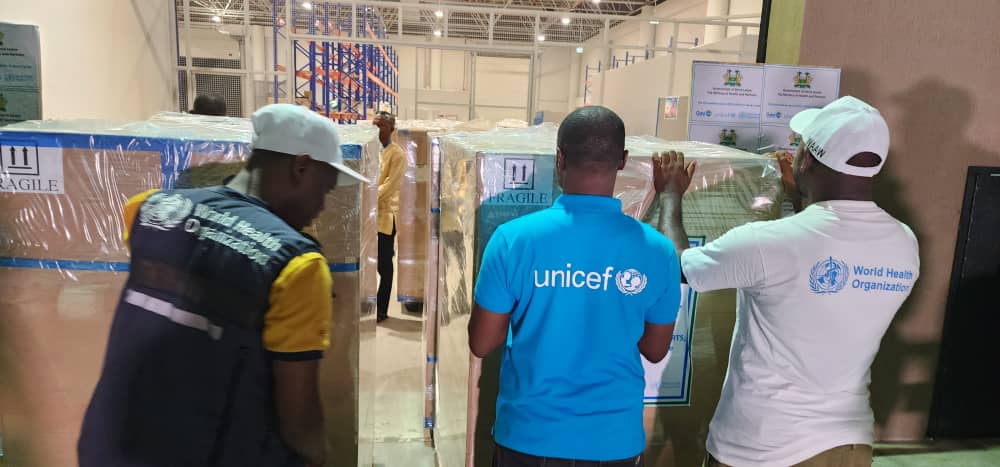Sierra Leone Receives Landmark Shipment of WHO-Approved Malaria Vaccine

In a recent development, Sierra Leone, in collaboration with the World Health Organization (WHO), UNICEF, and Gavi, has taken a significant step forward in the fight against malaria. On December 15, 2023, the WHO Sierra Leone team, led by the WHO Country Representative Dr. Innocent Bright Nuwagira, joined forces with the Ministry of Health senior leadership, led by the Minister of Health Dr. Austin Demby, the two deputy ministers of health Dr. Charles Senessie, and Dr. Jalikatu Mustapha, and the UNICEF Representative to receive a momentous shipment of more than 550,000 doses of the WHO-approved malaria vaccine.
This delivery marks a critical milestone in Sierra Leone's battle against malaria, a disease that has significantly impacted public health across the African continent. Sierra Leone is among the nine countries, including Benin, Burkina Faso, Burundi, Cameroon, the Democratic Republic of the Congo, Liberia, Niger, and Uganda, set to introduce the vaccine into their routine immunization programs for the first time.
Since 2019, Ghana, Kenya, and Malawi have been successfully delivering the RTS, S/AS01 vaccine through the Malaria Vaccine Implementation Program (MVIP). Over 1.7 million children in these three countries have received the vaccine, demonstrating its safety and efficacy. This initiative has resulted in a substantial reduction in severe malaria cases and a significant decrease in child deaths.
The initial 18 million dose allocation, facilitated by the collaborative efforts of WHO, Gavi, the Global Fund to Fight AIDS, Tuberculosis and Malaria, UNICEF and Unitaid, will empower Sierra Leone to extend this life-saving intervention to its most vulnerable populations. In addition to the vaccine, Sierra Leone will continue to implement other preventive measures, including the use of insecticide-treated bed nets (ITNs) and widespread malaria testing.
Malaria burden in Sierra Leone accounts for over two million hospital visits annually. With the arrival of these new vaccines, the nation is poised to witness a transformative reduction in the number of hospital visits, admissions, and, most importantly, deaths related to malaria.
The significance of this WHO-approved malaria vaccine goes beyond its immediate impact. It is a beacon of hope for families and communities, signaling a breakthrough in child health and survival. The first allocation of vaccine doses is strategically prioritized for children at the highest risk of succumbing to malaria, aiming to address health disparities and save young lives.
Speaking on this milestone, the Minister of health, Dr. Demby emphasized, "The high demand for the vaccine and the strong reach of childhood immunization will increase equity in access to malaria prevention and save many young lives. We will work tirelessly to increase supply until all children at risk have access."
On his part, the WHO Representative, Dr. Innocent Nuwagira, assured the country that the vaccine is approved by WHO for use, and hoped that the population will embrace it to optimize its use. He assured the MOH and GOSL of WHO’s commitment to support the planning, preparations and roll out of the vaccine early next year. “All of us at WHO, all levels of the organization, are at your service to support the next phases of this exercise” said the WHO Representative. Adding that the introduction of the vaccine is going to be a game changer in the fight against malaria in the country.

This WHO support builds on several other high-impact technical and financial support in this area. With funding from GAVI, GIZ, WHO AFRO and others, WCO Sierra Leone has been able to support government in the reactive campaign against measles that has drastically reduced measles cases ending one of the longest measles outbreaks in the country. With WHO support the country is almost completing an EPI Comprehensive review that will inform programming moving forward. The WHO is also providing financial and technical support to the population-based EPI Survey to be undertaken by Statistics Sierra Leone and MOH. These efforts are further complemented by the ongoing WHO support towards mass distribution of insecticide treated mosquito nets and the recent establishment of the Child Health Program in the ministry of health among others. All these efforts are expected to drastically reduce child and maternal deaths in the country.

As Sierra Leone prepares to roll out the malaria vaccine in early 2024, the nation stands united in its commitment to transforming the futures of its children and ensuring a healthier, malaria-free tomorrow. The collaboration between international organizations and local authorities serves as a testament to the power of collective action in advancing global health initiatives.
WHO Sierra Leone
Email: sharkahm [at] who.int